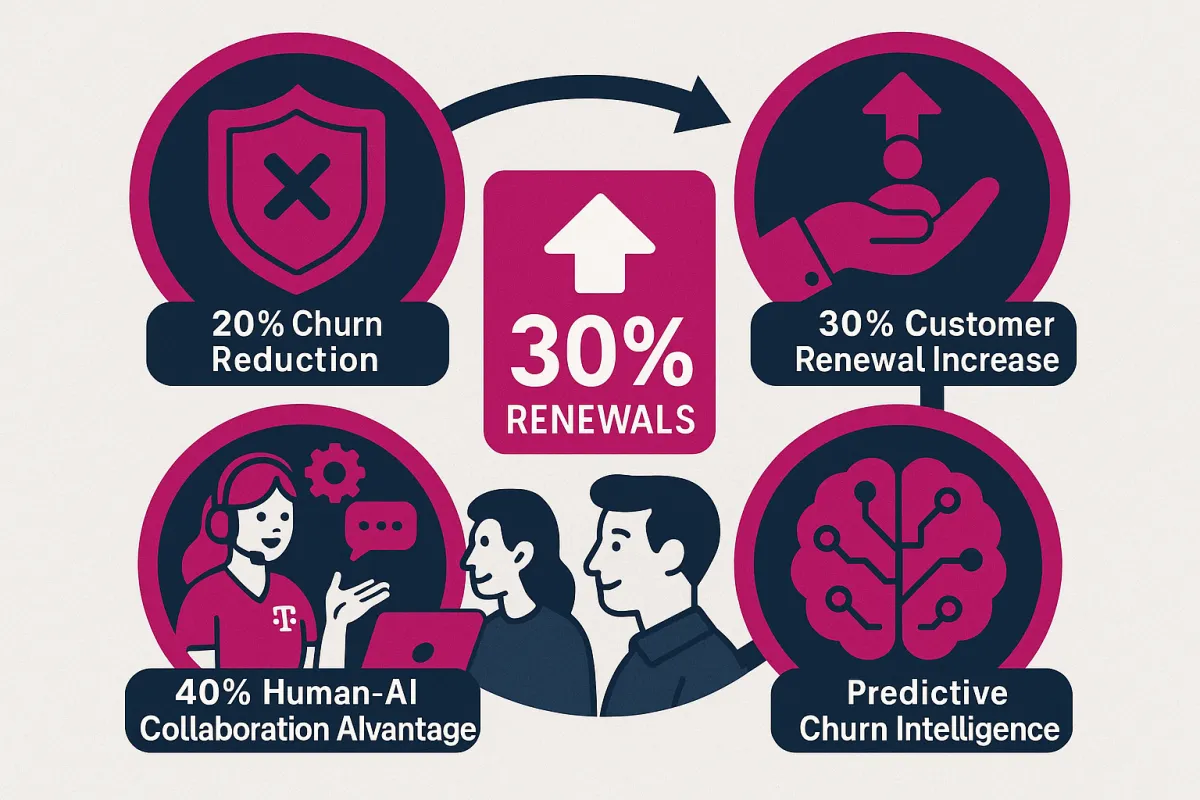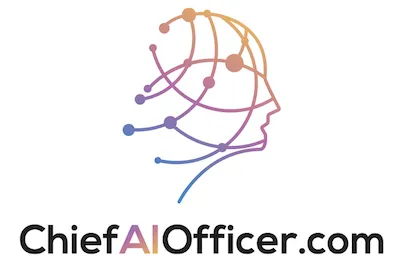
The T-Mobile AI Strategy That Increased Customer Renewals 30%
The T-Mobile AI Strategy That Increased Customer Renewals 30%
T-Mobile's AI strategy for retention at scale focuses on leveraging advanced machine learning and predictive analytics to proactively identify customers at risk of churn while delivering highly personalized retention interventions. This multifaceted approach integrates technology and human expertise across channels and touchpoints.
Their human-AI collaboration through the "Team of Experts" model uses AI-driven insights to inform conversations while retaining human empathy and problem-solving, achieving 40% higher retention rates compared to purely automated or human-operated approaches. The strategy delivers 20% churn reduction and 30% increase in customer renewals.
This isn't just telecom customer service improvement. This is a blueprint for AI-powered retention transformation that demonstrates how predictive intelligence combined with human expertise creates competitive advantages that reactive customer service cannot match.
The 20% Churn Reduction Achievement
T-Mobile achieved 20% reduction in churn rates through proactive, data-driven engagement that identifies at-risk customers before they decide to leave rather than responding to cancellation requests.
The reduction achievement demonstrates how AI creates retention capabilities that reactive customer service cannot achieve through predictive intervention and personalized engagement optimization.
Telecom companies that wait for customer cancellation requests will find themselves retention-limited compared to AI-enhanced prediction that prevents churn through proactive intervention.
The 30% Customer Renewal Increase
AI-powered personalized retention offers drive 30% increase in customer renewals through tailored interventions including custom discounts, loyalty rewards, and exclusive promotions based on risk profiles and preferences.
The renewal increase reveals how AI creates customer engagement capabilities that generic retention approaches cannot achieve through personalization that addresses individual customer concerns and preferences.
Customer service operations that use standard retention offers will find themselves conversion-limited compared to AI-enhanced personalization that optimizes retention interventions for individual customer contexts.
The 40% Human-AI Collaboration Advantage
T-Mobile's "Team of Experts" model achieves 40% higher retention rates compared to purely automated or human-operated approaches by combining AI insights with human empathy and problem-solving capabilities.
The collaboration advantage demonstrates how AI-human partnership creates retention capabilities that neither pure automation nor traditional human service can achieve through intelligent augmentation.
Companies that choose between AI automation or human service miss opportunities for hybrid approaches that combine AI intelligence with human emotional connection for superior retention results.
The Predictive Churn Intelligence
Machine learning models analyze diverse customer data including call patterns, data usage, payment history, and service interactions to assign churn risk scores that enable targeted retention efforts.
The predictive intelligence reveals how AI creates customer insight capabilities that traditional analytics cannot achieve through comprehensive behavioral analysis and risk assessment.
Telecom providers that rely on historical churn analysis will find themselves prediction-limited compared to AI-enhanced modeling that identifies at-risk customers before churn indicators become obvious.
The Real-Time Support Optimization
AI analyzes customer inquiries and sentiment in real-time to recommend specific troubleshooting steps and interventions personalized to customer situations, reducing call center resolution times by 25%.
The optimization capability demonstrates how AI creates customer service efficiency that traditional support approaches cannot achieve through intelligent response recommendation and priority optimization.
Call centers that use traditional support protocols will find themselves resolution-limited compared to AI-enhanced optimization that provides personalized solutions and reduces interaction time.
The Proactive Engagement Strategy
AI-powered chatbots proactively engage at-risk customers as first line of defense rather than waiting for customer-initiated contact that indicates advanced churn risk.
The proactive strategy reveals how AI creates customer relationship capabilities that reactive service approaches cannot achieve through early intervention and relationship preservation.
Customer service organizations that maintain reactive approaches will find themselves intervention-limited compared to AI-enhanced proactive engagement that addresses issues before they escalate.
The Personalized Intervention Framework
AI segments customers based on risk profiles and preferences to deliver tailored retention offers that address specific customer concerns and value propositions rather than generic retention attempts.
The framework demonstrates how AI creates customer engagement capabilities that mass marketing approaches cannot achieve through individual preference understanding and customized intervention design.
Retention programs that use standardized approaches will find themselves effectiveness-limited compared to AI-enhanced personalization that addresses individual customer motivations and concerns.
The 3.3% First Call Resolution Improvement
T-Mobile achieved 3.3% increase in first call resolution through AI-enhanced customer interaction relevance that addresses customer issues more effectively during initial contact.
The resolution improvement reveals how AI creates customer service capabilities that traditional call handling cannot achieve through intelligent issue identification and solution optimization.
Customer service operations that rely on traditional escalation approaches will find themselves efficiency-limited compared to AI-enhanced resolution that solves problems during first customer contact.
The 7.5% Net Promoter Score Enhancement
AI-driven customer interaction improvements deliver 7.5% increase in Net Promoter Score by making customer service more relevant and effective for individual customer situations.
The score enhancement demonstrates how AI creates customer satisfaction capabilities that traditional service approaches cannot achieve through personalized interaction quality and issue resolution effectiveness.
Companies that maintain traditional customer service will find themselves satisfaction-limited compared to AI-enhanced interactions that improve customer experience and loyalty measurement.
The Team of Experts Integration
T-Mobile's approach empowers rather than replaces employees by providing AI insights that inform human conversations while preserving empathy and creative problem-solving capabilities.
The integration model reveals how successful AI implementation enhances human capabilities rather than threatening employment through intelligent augmentation that improves rather than replaces human expertise.
Organizations that view AI as employee replacement will achieve lower adoption and results compared to enhancement approaches that improve human capability and job satisfaction.
The Governance and Transparency Framework
T-Mobile establishes governance frameworks, cross-functional collaboration, and transparency through accessible reporting that fosters trust in AI technology among frontline staff.
The framework approach demonstrates how AI implementation success requires organizational change management rather than just technology deployment when achieving enterprise-wide adoption and effectiveness.
Companies that implement AI without governance frameworks will achieve limited adoption compared to systematic approaches that build trust and collaboration across organizational functions.
The Revenue Protection Impact
Improved efficiency in call centers and higher recurring revenue retention result from preemptive customer support and strategic offer optimization that preserves customer relationships and lifetime value.
The protection impact reveals how AI creates financial benefits that extend beyond cost reduction to include revenue preservation and customer lifetime value optimization.
Telecom companies that focus only on acquisition costs miss opportunities for retention value that AI-enhanced customer relationship management provides through churn prevention and loyalty improvement.
The Cross-Functional AI Integration
T-Mobile integrates AI across customer service, marketing, and network operations to maximize business impact rather than limiting AI implementation to individual departments or functions.
The integration approach demonstrates how comprehensive AI transformation requires enterprise-wide deployment rather than departmental applications that don't create systematic competitive advantages.
Organizations that implement AI in isolated departments miss opportunities for comprehensive transformation that integrated AI strategies provide across entire business operations.
The Ethical AI Practice Advantage
Transparent, ethical AI practices strengthen customer relationships and trust, creating additional retention benefits beyond direct intervention effectiveness and customer service improvement.
The practice advantage reveals how responsible AI implementation creates customer relationship benefits that traditional approaches cannot achieve through trust building and transparency demonstration.
Companies that implement AI without ethical considerations will face customer trust challenges compared to responsible approaches that build confidence through transparent and ethical AI deployment.
The Scale and Efficiency Optimization
T-Mobile's success in scaling AI-driven retention programs demonstrates how enterprise AI requires systematic implementation rather than pilot program approaches when achieving transformation impact.
The optimization approach reveals how AI transformation success depends on scale execution rather than limited testing when creating competitive advantages and operational improvement.
Telecom providers that maintain pilot program approaches will achieve limited AI value compared to scaled implementations that transform entire customer relationship management operations.
The Customer Experience Enhancement
AI improvements create customer experience advantages that traditional service approaches cannot match through personalized interaction quality and proactive relationship management.
The enhancement capability demonstrates how AI creates customer satisfaction that extends beyond issue resolution to include relationship quality and loyalty development.
Customer service organizations that focus only on problem-solving miss opportunities for relationship enhancement that AI-powered customer experience provides through personalized engagement and proactive care.
The Competitive Market Positioning
T-Mobile's AI retention capabilities create market positioning advantages that traditional telecom customer service cannot match through superior customer relationship management and churn prevention.
The positioning advantages reveal how AI transformation affects competitive dynamics by enabling customer retention capabilities that traditional approaches cannot achieve.
Telecom companies that delay AI retention implementation will find themselves competitively disadvantaged compared to AI-enhanced customer relationship management that provides superior retention and loyalty results.
The Technology-Human Balance Strategy
T-Mobile's approach recognizes that sustainable retention improvement requires both technical sophistication and meaningful customer experience through intelligent human-AI collaboration.
The balance strategy demonstrates how successful AI implementation requires strategic thinking about human-technology partnership rather than choosing between automation and human service.
Organizations that view AI and human capability as competing alternatives miss opportunities for collaborative approaches that optimize both technological efficiency and human relationship quality.
The Strategic Investment Philosophy
T-Mobile's retention AI investment represents strategic commitment to customer relationship transformation rather than limiting focus to cost reduction or efficiency improvement alone.
The investment philosophy demonstrates how market leaders approach AI as fundamental business strategy rather than operational enhancement when creating sustainable competitive advantages.
Companies that limit AI investment to efficiency projects miss opportunities for strategic transformation that comprehensive AI implementation provides through customer relationship optimization.
The Future Telecom Reality
T-Mobile's AI success establishes telecom reality where predictive retention capabilities become essential for competitive customer relationship management rather than optional enhancement.
The future reality reveals why telecom AI transformation requires immediate strategic commitment rather than gradual evaluation that delays competitive advantage while AI-enhanced providers establish market dominance.
The choice facing every telecom executive is whether to implement AI-powered retention that predicts and prevents churn or accept competitive disadvantage to organizations that transform customer relationships through predictive intelligence and personalized intervention.
The Executive Decision Framework
T-Mobile's AI implementation provides decision framework that telecom and customer service executives can adapt for their own retention transformation and competitive positioning requirements.
The framework prioritizes predictive intervention over reactive service, human-AI collaboration over pure automation, and customer relationship enhancement over cost reduction alone.
Organizations that apply comprehensive AI retention strategies will achieve competitive advantages while companies focused on traditional customer service will struggle to compete with predictive relationship management and personalized retention capabilities.
The evidence is compelling: T-Mobile achieved 20% churn reduction and 40% higher retention rates through AI-human collaboration that predicts customer risk and delivers personalized interventions. The strategic choice facing every executive is whether to implement predictive AI retention or accept competitive disadvantage to organizations that transform customer relationships through artificial intelligence and proactive relationship management.

